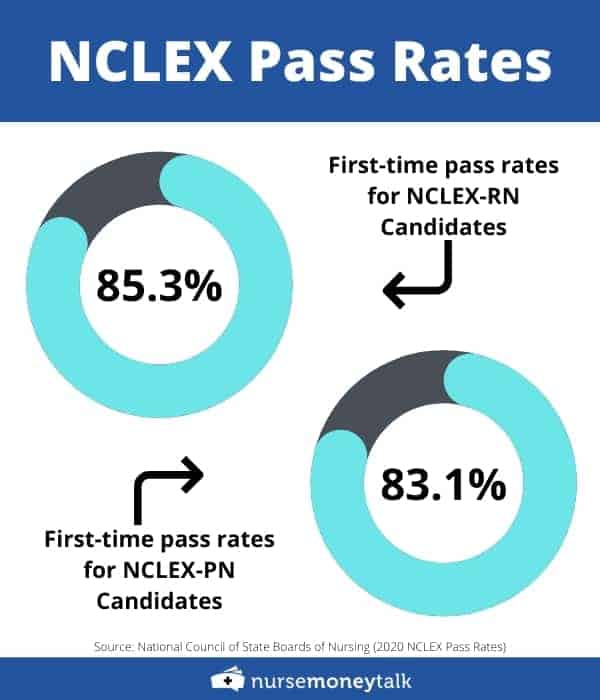The NCLEX has a reputation for being an impossible to pass exam. So many students stress about the NCLEX exam as they get closer to graduation, but is all that worry really warranted? I’m going to talk about that in this article.
Make sure to read till the end because I will share some good statistics that will make you feel better and some helpful ways you can be more successful on the NCLEX board exam.
*Disclosure: This article on is the NCLEX hard may contain affiliate links. If you click and make a purchase, I may receive a commission. For more info, please see my disclaimer.
Is the NCLEX Hard?
The NCLEX is a hard exam, but it’s not impossible to pass. Statistically, over 80% of students who take the NCLEX RN or NCLEX PN exam will pass. Most likely, a student will pass if they went to a good nursing program, bought a good NCLEX prep course, and has a good NCLEX study plan in place.
For you to get a better grasp on the NCLEX, I’m going to cover real quick what the NCLEX is and how it’s scored. I think part of the reason so many students get really nervous about the NCLEX is that many lack a good understanding of the NCLEX itself.
NCLEX Prep Academy
Check out the comprehensive NCLEX prep review that I recommend. Don’t bother with other NCLEX preps that over promise and under deliver. Did I mention they have a 99.86% NCLEX pass rate?
What is the NCLEX?
The NCLEX, or National Council Licensure Examination, is a computerized exam. It determines whether or not a student is eligible to be licensed as either a Registered Nurse (NCLEX-RN Exam) or as a Licensed Practical Nurse/Licensed Vocational Nurse (NCLEX-PN Exam) after completing a nursing program.
The NCLEX is comprised of multiple-choice questions and includes four primary categories, two of which are broken into subcategories:
- Safe and Effective Care Environment
- Management of Care
- Safety and Infection Control
- Health Promotion and Maintenance
- Psychosocial Integrity
- Physiological Integrity
- Basic Care and Comfort
- Pharmacological and Parenteral Therapies
- Reduction of Risk Potential
- Physiological Adaptation
The exam is administered at numerous Pearson Vue testing centers and is offered almost daily in most major metropolitan areas.
How is the NCLEX Scored?
The NCLEX is scored using computer adaptive testing. The questions are based on how the test taker is doing. As the test taker answers questions correctly, they keep getting harder questions. If the test taker answers questions incorrectly, they’ll keep getting easier questions.
This keeps happening until the computer is confident you will stay above their set threshold if it keeps asking you questions. I know that might seem a bit confusing I go over it in more detail in this article about whether or not you can fail the NCLEX in 75 questions.
Check out the linked article if you want more information. I don’t want to bog you down with too much information in this article, but it’s available in that article if you want to read it.
Why is the NCLEX Hard?
Here are some of the reasons why the NCLEX is so hard.
1. It’s a Critical Thinking Exam Not a Memorization Exam
If you’ve even started 1 week in nursing school, I’m sure you’ve heard multiple times over about how the test questions in nursing school aren’t testing your memorization skills but your critical thinking skills.
Well, the same is true for the NCLEX. Rote memorization is not what’s emphasized but your ability to look at problems and analyze them using the nursing process.
Here’s an illustration of how I look at nursing school questions versus regular college exam questions. Take a look at the image below. If you get a multiple-choice exam, it will look something like this.

As you can see from the above picture, there are five answer choices, but there’s clearly one correct answer and four incorrect answers.
Let’s compare that to multiple-choice questions in nursing school, which look something like this.

As you can see in the above example, all five answer choices are actually correct, but there’s only one answer choice that’s the most correct. If that just feels frustrating, then you’re starting to realize one of the things that makes the NCLEX so hard.
Related: Are NCLEX Quick Results Available on the Weekend?
2. It Covers a Lot of Material
I already mentioned above the topics the NCLEX covers. What I didn’t say is that all of that material spans your entire nursing student career.
That’s right!
Pretty much everything you learned from day 1 of nursing school to your last class is up for grabs. For the record, that’s a lot of material.
To make matters worse, most of the content covered in nursing school kind of builds on itself. So if there’s a concept you didn’t get a firm grasp on that could come back to haunt you later in another topic that’s building off of the one you didn’t master.
NCLEX Prep Academy
Check out the comprehensive NCLEX prep review that I recommend. Don’t bother with other NCLEX preps that over promise and under deliver. Did I mention they have a 99.86% NCLEX pass rate?
3. Most Students Psych Themselves Out
I truly believe most students psych themselves out before ever going into the NCLEX. I understand why it happens. It’s a challenging exam. So many other students will spread their anxiety to others, and it’s like the gatekeeper for what you’ve been working towards the last several years of your life.
I get all of that, but walking into the NCLEX or trying to study for it with an already defeated mentality does NOT set you up for success.
I touched on this a little bit above, but you need to remember that most students will pass the NCLEX. Looking at the graph below, you’ll see the pass rates for first-time test takers of both the NCLEX-PN and NCLEX-RN.

How to Prepare Yourself For the NCLEX
The NCLEX is not so much an impossible exam as it is an exam that is challenging and will test how much you really want to become a nurse. It doesn’t measure your intelligence, so whether or not you pass or fail doesn’t mean you’re smarter or dumber than the next nurse.
It will test your ability to think critically and remain determined and focused on the goal of becoming a nurse. Most students can and do pass the NCLEX, so you can too.
Here are some quick tips on how to pass the NCLEX. For more tips, tricks, and hacks, make sure to check out the linked article.
1. Get a Good NCLEX Prep
A good prep course such as this one can help keep you organized and give you the tools you’ll need to succeed on the NCLEX.
2. Get a Study Plan
There’s so much material that can be covered on the NCLEX. What really helps is having a good study plan of what you’re going to cover and when up until your test date.
Some NCLEX prep courses like the one I mentioned above will actually give you a study plan based on the date of when you’re going to take the NCLEX.
3. Make Sure You’re Pacing Yourself
Spending time studying is worthless if you’re not retaining the information. Make sure you’re working smarter and not harder by pacing yourself and taking breaks every couple of hours or so to stay refreshed.
4. Excercise Well, Sleep Well, Eat Well
Make sure you’re getting plenty of sleep and staying healthy during the process. Not only does eating, sleeping, and exercising help with studying, you’ll just overall feel better.
You Can Do it!
The NCLEX is hard, but as you’ve seen above, it’s not anywhere near the impossible exams you’re led to believe. As long as you go into the test with a good plan of action
Have You Read These Yet?
- I’m Scared to Take the NCLEX
- 8 Best NCLEX Prep Course
- Best NCLEX-RN Review Books
- What to Do After Failing the NCLEX?

